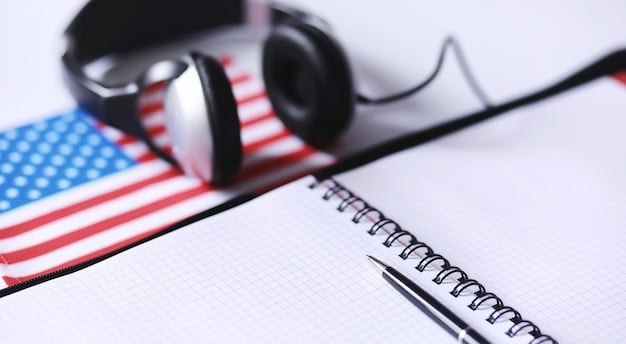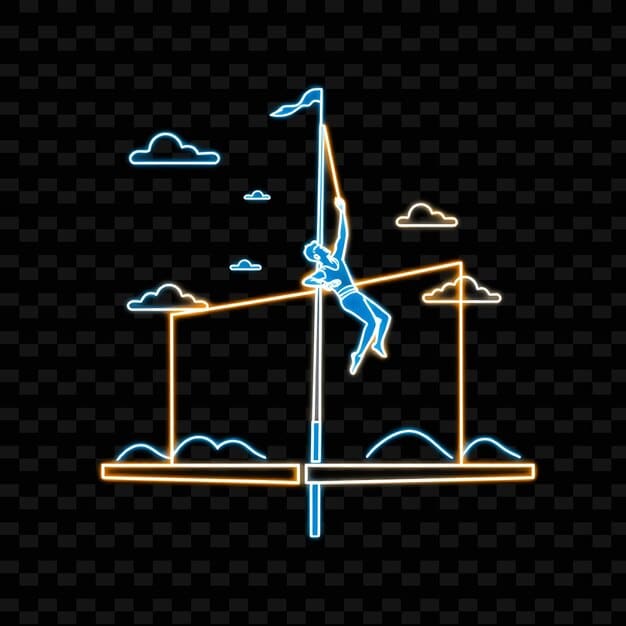Podcast Legal Considerations: Copyright and Fair Use in the US

Navigating the intricate landscape of podcast legal considerations: understanding copyright and fair use in the US is crucial for creators, ensuring compliance and mitigating risks while building a sustainable and ethical presence in the digital audio realm.
Diving into the world of podcasting offers immense creative freedom and direct connection with listeners, but this dynamic landscape is not without its complexities. One of the most critical aspects for any podcaster to grasp involves podcast legal considerations: understanding copyright and fair use in the US. Ignoring these foundational principles can lead to significant legal headaches, from costly lawsuits to the removal of your content. This guide aims to shed light on these vital legal tenets, helping you produce engaging content responsibly and confidently.
Understanding the Foundation: What is Copyright?
Copyright law serves as the bedrock for protecting original creative works, granting creators exclusive rights over their creations. For podcasters, this means understanding what intellectual property is and how it applies to audio content, music, scripts, and even sound effects. In the United States, copyright protection arises automatically the moment an original work is fixed in a tangible medium, which for podcasts includes the recording itself, any written scripts, and incorporated audio elements.
The core purpose of copyright is to incentivize creativity by providing creators with control over how their work is used, reproduced, distributed, performed, and displayed. This protection is not infinite, though. Generally, copyright lasts for the life of the author plus 70 years. For works made for hire or anonymous/pseudonymous works, it’s 95 years from publication or 120 years from creation, whichever is shorter.
Knowing what is copyrightable is the first step toward effective legal compliance. Ideas themselves cannot be copyrighted, only the unique expression of those ideas. This distinction is vital for podcasters who might be discussing popular topics or news events. While you can discuss an event, you cannot simply copy another podcast’s narrative or script without permission.
One common misconception is that if something is publicly available online, it’s free to use. This is unequivocally false. The internet is merely a distribution channel, and content shared there is still subject to copyright protections unless explicitly stated otherwise or falls under specific exceptions like public domain.
Types of Copyright Infringement
Copyright infringement occurs when someone uses a copyrighted work without permission from the copyright holder. This can manifest in several ways within the podcasting sphere:
- Direct Infringement: Directly copying, distributing, or performing a copyrighted work without authorization.
- Contributory Infringement: Inducing or materially contributing to another’s infringing conduct.
- Vicarious Infringement: Having the right and ability to supervise the infringing activity and having a direct financial interest in it.
These distinctions are important because the penalties for infringement can be severe, ranging from monetary damages (actual damages or statutory damages, which can be up to $150,000 per infringed work for willful infringement) to injunctions forcing the removal of content.
Understanding these fundamental aspects of copyright is not just about avoiding legal trouble; it’s about respecting the creative efforts of others and fostering a responsible content creation ecosystem. As podcasters, we benefit from these protections for our own work, so upholding them for others is a matter of professional integrity.
Navigating Fair Use: The Balancing Act
While copyright laws protect creators, they also include provisions designed to promote free speech and creativity through careful exceptions. One of the most significant of these is the doctrine of fair use. Fair use allows for certain limited uses of copyrighted material without obtaining permission from the copyright holder, typically for purposes such as criticism, comment, news reporting, teaching, scholarship, or research.
However, fair use is not a clear-cut rule but rather a flexible standard, requiring a case-by-case analysis. It’s often described as an affirmative defense, meaning that if you’re sued for copyright infringement, you can argue that your use was fair. There are four factors courts consider when evaluating a fair use claim, and no single factor is determinative. All four must be weighed against each other:
The Four Factors of Fair Use
The U.S. Copyright Act (Section 107) outlines these four critical factors:
- Purpose and Character of the Use: Is the use commercial or for non-profit educational purposes? Transformative uses, which add new meaning or purpose to the original work, are more likely to be considered fair. For example, using a song clip for a parody (transformative) is more likely to be fair use than simply playing the whole song to set a mood (non-transformative commercial use).
- Nature of the Copyrighted Work: This factor examines the original work. Factual works (like news reports) tend to receive less protection than creative works (like songs or novels), making factual works more amenable to fair use. Unpublished works are also generally subject to more protection than published works.
- Amount and Substantiality of the Portion Used: This factor considers how much of the copyrighted work was used in relation to the whole. Using a small, insubstantial portion is more likely to be fair use than using a substantial part or the “heart” of the work. There’s no magical percentage; even a short clip can be infringing if it’s the core of the original work.
- Effect of the Use Upon the Potential Market for or Value of the Copyrighted Work: This is often considered the most important factor. Does your use harm the market for the original work, or potentially displace sales? If your podcast’s use of a song clip reduces the need for listeners to purchase or stream the original song, it’s less likely to be fair use.
For podcasters, applying these factors requires careful thought. Using a short snippet of a movie for a review is often fair use. Playing multiple full songs as background music without permission, even if you credit the artist, is almost certainly not. The line between fair use and infringement can be blurry, and “I gave credit” is not a valid defense against copyright infringement.
It’s important to remember that fair use is a legal defense, not a right to use anything you want. When in doubt, seeking permission is always the safest course of action. Relying solely on a fair use claim can be risky if not thoroughly considered and applied.

Music Licensing for Podcasters: A Specific Challenge
Music is a powerful tool in podcasting, enhancing listener engagement and setting the mood. However, using copyrighted music without proper authorization is one of the most common pitfalls for podcasters. Unlike spoken word, which might fall under fair use more readily for discussion and commentary, music generally has a much stricter interpretation under copyright law due to its distinct market value and the way it’s typically consumed.
To legally use copyrighted music in your podcast, you usually need to obtain specific licenses. There are several types of licenses, and understanding which ones apply to your use case is crucial.
Types of Music Licenses
When incorporating music into your podcast, you generally need to consider two primary types of licenses:
- Synchronization License (Sync License): This license is required if you are combining a musical work with visual media (like a video podcast) or an audio-only recording (like a podcast). It grants you the right to “sync” the music to your content. This license is obtained from the copyright holder of the musical composition (usually the songwriter or publisher).
- Master Use License: This license grants you the right to use a specific recording (the “master recording”) of a song. This is obtained from the copyright holder of the sound recording (usually the record label). Even if you have a sync license, you still need a master use license to use a specific recorded version of the song.
Additionally, if your podcast is publicly performed (which streaming a podcast online generally qualifies as), you may also need performance licenses. These are typically handled by Performing Rights Organizations (PROs) like ASCAP, BMI, and SESAC in the US.
Alternatives to Licensed Music
For podcasters looking to avoid the complexities and costs associated with licensing popular music, several safe alternatives exist:
- Royalty-Free Music: This term can be misleading. “Royalty-free” usually means you pay a one-time fee for the right to use the music without paying ongoing royalties. However, you must still adhere to the specific terms of the license, which might restrict commercial use or require attribution. Platforms like Epidemic Sound, Artlist, and AudioJungle offer vast libraries of royalty-free music tailored for content creators.
- Creative Commons Licenses: Some artists choose to license their work under Creative Commons (CC) licenses, which allow for certain uses depending on the specific license type. Always check the specific CC license (e.g., CC BY – attribution required; CC BY-SA – share-alike) to ensure compliance. Not all CC licenses allow commercial use or modifications.
- Public Domain Music: Works in the public domain are no longer protected by copyright and can be freely used by anyone. In the US, works published before 1929 are generally in the public domain. However, a modern recording of a public domain song might still be copyrighted itself.
- Original Music: The safest route is to create your own original music or commission a composer to create music for your podcast. In this case, you own the copyright (or acquire the necessary rights) and have complete control over its use.
The cost and complexity of music licensing mean that many independent podcasters opt for royalty-free or Creative Commons music. Investing in proper music licensing is not just a legal obligation; it’s an ethical choice that supports musicians and protects your podcast from future legal complications.
Content Creation Best Practices: Avoiding Infringement
Beyond music, podcasters must be vigilant about all forms of content they incorporate into their shows. This includes sound effects, spoken word clips from other media, images (if your podcast has a visual component or promotional materials), and even the ideas presented in your discussions. Adhering to best practices can significantly reduce your risk of copyright infringement.
Utilizing Stock Media Legally
Many podcasters turn to stock media libraries for sound effects, intro/outro music, or background audio. While these resources are convenient, it’s paramount to understand the specific license terms associated with each asset. A typical stock media license might permit use in a single podcast episode but prohibit redistribution as a standalone sound effect, or it might require attribution in your show notes. Always read the fine print.
For images used in podcast cover art or social media promotion, be equally careful. Websites like Unsplash, Pexels, and Pixabay offer free stock photos, but again, check the license. Some require attribution, while others don’t, but all have terms of use that must be respected.
Permissions and Releases
If you’re interviewing guests or featuring listeners, consider obtaining releases. A standard guest release form might grant you permission to record and distribute their voice and likeness in your podcast. While not strictly a copyright issue in the same way music is, it falls under broader legal considerations related to publicity rights and defamation.
Similarly, if you’re quoting extensively from a book, article, or other written work, consider whether your use falls under fair use. For anything beyond short, transformative snippets for commentary, seeking permission from the author or publisher is advised. Remember, even quoting a public figure’s speech verbatim without commentary can be problematic if it’s a significant portion of their work and impacts its market.
Original Content and Attribution
The safest path in podcasting is to create as much original content as possible. Your discussions, your personal stories, your unique insights – these are inherently yours and protected by your own copyright. When you do reference or utilize external material, provide clear attribution. While attribution alone doesn’t grant you permission to use copyrighted material, it is considered a sign of good faith and is often a requirement of many Creative Commons or stock media licenses.
For example, if you discuss a news article, you might state: “According to a recent report by The New York Times on [Topic X]…” This clearly attributes the source of your information without infringing on the newspaper’s copyright over the actual text or images within their article. Best practices for podcasters include:
- Cite your sources: Always clearly state where your information, quotes, or sound bites originate.
- Educate your team: If you work with co-hosts, producers, or editors, ensure they are also aware of copyright and fair use principles.
- When in doubt, don’t use it: If you’re unsure whether a piece of content is legally cleared for use, err on the side of caution. It’s better to find an alternative or seek legal counsel than face a potential lawsuit or cease and desist order.
Fostering a culture of respect for intellectual property within your podcasting practice not only protects you legally but also enhances your reputation as a responsible and ethical content creator.
Defamation, Privacy, and Libel in Podcasting
Beyond copyright, podcasters must also be acutely aware of laws pertaining to defamation, privacy, and libel. While your words might be spoken, their impact can be just as significant as written statements, potentially leading to legal repercussions if you’re not careful. The digital nature of podcasts means that defamatory statements can reach a wide audience quickly and persist indefinitely.
Understanding Defamation and Libel
Defamation is a false statement communicated to a third party that harms another person’s reputation. When defamation is in written or recorded form (like a podcast), it’s specifically called libel. Slander refers to spoken defamation, but since podcasts are recorded, any defamatory statements made on a podcast would generally fall under libel.
To prove defamation, a plaintiff generally needs to demonstrate several elements:
- False Statement of Fact: The statement must be presented as a fact, not an opinion, and must be verifiably false.
- Publication: The statement must be communicated to at least one other person (which publishing a podcast certainly does).
- Harm to Reputation: The false statement must have caused actual damage to the subject’s reputation (e.g., loss of income, public humiliation).
- Fault: The speaker must have acted with some degree of fault, typically negligence for private figures, or “actual malice” (knowing the statement was false or acting with reckless disregard for the truth) for public figures.
Podcasters must be extremely cautious when discussing individuals, companies, or products, especially if making negative claims. Always prioritize factual accuracy and be able to substantiate any claims you make about third parties.
Privacy Concerns in Podcasting
Privacy laws protect individuals from having their private lives intruded upon or publicized without their consent. For podcasters, this typically involves two main areas:
- Right to Privacy: This includes protection against intrusion upon seclusion (e.g., secretly recording someone in a private place), public disclosure of private facts (disclosing highly offensive private information about someone that is not of legitimate public concern), false light (portraying someone in a misleading or offensive way), and appropriation of name or likeness (using someone’s identity for commercial gain without permission).
- “One-Party” or “Two-Party” Consent Laws for Recordings: Before recording conversations for your podcast, especially with guests or during phone calls, understand your state’s consent laws. Most US states are “one-party consent” states, meaning only one person involved in the conversation needs to know it’s being recorded. However, some states (like California, Florida, Illinois, Maryland, Massachusetts, Montana, New Hampshire, Pennsylvania, and Washington) are “two-party” or “all-party” consent states, requiring everyone involved to agree to the recording. Always disclose that you are recording and obtain clear consent.
When discussing sensitive topics or individuals, especially those not in the public eye, exercise extreme caution. If in doubt, anonymize details or seek explicit permission. Remember, even if something is technically legal, it might not be ethical or conducive to good listener relations.
For podcasters, maintaining careful editorial judgment, verifying facts, and understanding consent laws are crucial steps in avoiding costly and damaging legal disputes related to defamation and privacy.
Advertising and FTC Regulations for Podcasters
As podcasts gain popularity and become viable platforms for monetization, podcasters must also navigate regulations concerning advertising, endorsements, and sponsorships. The Federal Trade Commission (FTC) in the US has specific guidelines to ensure transparency and protect consumers from deceptive marketing practices. Ignorance of these rules is not a defense, and non-compliance can lead to hefty fines.
FTC Disclosure Guidelines
The core principle of FTC guidelines for endorsements and testimonials is transparency. If there’s a material connection between an endorser (the podcaster) and an advertiser (the brand), this connection must be clearly and conspicuously disclosed to the audience. A “material connection” can include financial compensation, free products, discounts, or any other benefit that might influence the endorser’s opinion.
For podcasters, this means:
- Clear and Conspicuous Disclosure: Disclosures must be easy to understand and hard to miss. Simply burying a disclosure in your show notes isn’t enough; it should ideally be given verbally during the podcast episode itself, at the point where the advertisement or endorsement is made (or a clear general disclosure at the beginning).
- “Ambassador” or “Partner” Relationships: If you have an ongoing relationship with a brand, stating “This episode is sponsored by [Brand]” is often sufficient. If you are specifically endorsing a product because you received it for free or were paid to review it, you might need to be more specific, e.g., “I received this product for free,” or “This review is part of a paid promotion.”
- Affiliate Links: If you include affiliate links in your show notes or episode descriptions (where you earn a commission on sales), you must disclose that these are affiliate links.
- Personal Use vs. Endorsement: If you genuinely use and like a product and decide to talk about it without any external influence or compensation, that’s fine. However, if that personal story is then used by a brand for marketing purposes, or if you later receive compensation, the disclosure requirements kick in.
The FTC’s goal is to ensure that audiences know when an advertisement is an advertisement, regardless of its format. This applies whether the endorsement is overt (a read ad) or subtle (an integrated product placement within the discussion).
Key Takeaways for Podcasters
To remain compliant with FTC regulations:
- Be Transparent: Always clearly disclose any material connections with brands or products you mention.
- Timeliness: Make disclosures at the relevant time in the podcast, preferably at the beginning of the episode or segment containing the advertisement.
- Clarity: Use simple, unambiguous language. Avoid jargon or small print. Common phrases include “sponsored by,” “ad,” “paid promotion,” or “I received this product free.”
- Consistency: Apply disclosure rules to all forms of marketing content you produce, whether it’s within the audio, in show notes, or on social media promoting the episode.
Compliance with FTC guidelines not only prevents legal trouble but also builds trust with your audience. An audience that feels respected and informed about commercial relationships is more likely to remain loyal. In the long run, transparency fosters a healthier and more credible podcasting industry.
Global Reach, Local Laws: International Considerations
While this guide focuses on podcast legal considerations: understanding copyright and fair use in the US, the global nature of podcast distribution means that creators based in the US might find their content consumed by audiences worldwide. This global reach introduces a layer of complexity: how do international laws impact your podcast?
It’s a common misconception that US law automatically applies to all online content. In reality, a podcast can potentially be subject to the laws of any country where it is accessed or where an alleged harm (like defamation or copyright infringement) occurs. This concept is often referred to as “jurisdiction.”
Copyright Across Borders
Copyright protection is largely governed by international treaties, primarily the Berne Convention for the Protection of Literary and Artistic Works. The Berne Convention dictates that member countries (which include most nations) must grant copyright protection to works originating in other member countries at least as broadly as they would to their own citizens’ works. This means that if you publish a podcast in the US, your copyright is generally recognized in other Berne Convention countries.
However, the specifics of how copyright is enforced, how fair use (or similar doctrines like “fair dealing” in other common law countries) is interpreted, and the penalties for infringement can vary significantly from one country to another. For instance, what might be considered fair use in the US might not be under Canada’s “fair dealing” or Europe’s more restrictive “quotation right.”
For podcasters who primarily target a US audience, adhering to US laws usually provides a strong baseline of protection and compliance. However, if you actively target audiences in specific countries, or if a significant part of your content involves materials from other countries, it’s wise to consider their local laws or seek specific legal advice in those jurisdictions.
Data Privacy Regulations
Perhaps the most significant international legal consideration for podcasters, especially those collecting any listener data (even just through analytics platforms), is global data privacy regulations. The European Union’s General Data Protection Regulation (GDPR) and various similar laws in other countries (like Brazil’s LGPD or Canada’s PIPEDA) have extraterritorial reach. This means they can apply to US-based podcasters if they process the personal data of individuals located in those regions.
While many podcast metrics systems collect anonymized data, if you gather email addresses for a newsletter, run contests that require personal information, or use advanced analytics that could identify individuals, you may need to ensure your data handling practices comply with these international standards. This typically involves:
- Providing clear privacy policies.
- Obtaining explicit consent for data collection and processing.
- Ensuring data security.
- Allowing individuals to access, rectify, or delete their data.
Simply having a “data processing addendum” with your analytics provider might not be enough; understanding your own responsibilities as a data controller is vital.
While it’s impractical for every podcaster to be an expert in the legal nuances of every country, being aware that international laws exist and can apply provides a crucial framework for risk assessment. For general information, focusing on US compliance is usually sufficient for a US-targeted podcast. However, for specialized content or significant international reach, professional legal counsel is always recommended.
The digital age erases geographical boundaries, making it imperative for content creators to think globally, even when operating locally.
| Key Point | Brief Description |
|---|---|
| 💡 Copyright Basics | Automatic protection for original works; crucial for audio, scripts, and music. Using others’ content without permission is infringement. |
| ⚖️ Fair Use Doctrine | Allows limited use of copyrighted material for purposes like criticism or commentary, based on four balancing factors. It’s a defense, not a right. |
| 🎶 Music Licensing | Requires Sync and Master Use licenses for copyrighted music. Options like royalty-free or public domain music are safer alternatives. |
| 🗣️ Defamation & FTC | Avoid false statements that harm reputation (libel). Disclose all material connections with advertisers/sponsors per FTC guidelines. |
Frequently Asked Questions About Podcast Legal Considerations
▼
While copyright protection is automatic upon creation, registering your podcast with the U.S. Copyright Office offers significant benefits. Registration is required before you can file a lawsuit for infringement, and it provides a public record of your ownership, which can deter infringers and simplify legal proceedings. It also makes it easier to claim statutory damages and attorney fees in a successful infringement suit.
▼
Using short audio clips from movies or TV shows can potentially fall under fair use if the purpose is transformative, such as for criticism, commentary, or parody. The “amount and substantiality” factor is key here; a very short snippet for review is more likely to be fair use than longer excerpts. However, it’s a case-by-case analysis, and there’s no guaranteed safe length. Commercial use lessens the likelihood of a fair use finding.
▼
“Royalty-free” music means you typically pay a one-time fee for a license to use the music without ongoing royalty payments. You must still adhere to specific license terms. “Public domain” music, conversely, has no copyright protection and can be used freely by anyone without a license or payment. However, a modern recording of a public domain song might still be copyrighted itself.
▼
Yes, it’s always best practice to get explicit consent from guests before recording. While federal law and many US states are “one-party consent” (meaning only you need to know you’re recording), some states require “all-party consent.” To avoid legal issues and maintain ethical standards, clearly inform your guests that they are being recorded and obtain their permission, ideally in writing via a simple guest release form.
▼
According to FTC guidelines, disclosures for sponsorships or affiliate relationships must be clear and conspicuous. This typically means making a verbal disclosure at the beginning of the episode or segment where the advertisement or product is mentioned. Don’t hide disclosures in show notes alone. The goal is audience transparency: listeners should clearly understand when content is influenced by a commercial relationship.
Conclusion
Navigating the legal intricacies of podcasting, from copyright and fair use to defamation and advertising regulations, might seem daunting. However, embracing these podcast legal considerations: understanding copyright and fair use in the US is not merely about avoiding penalties; it’s about building a robust, ethical, and sustainable foundation for your content creation. By respecting intellectual property, practicing transparency, and exercising due diligence, podcasters can ensure their voices are heard responsibly, fostering trust with their audience and contributing positively to the evolving digital audio landscape. Proactive legal awareness empowers creators to focus on what they do best: producing compelling audio experiences.





